Native shrubs offer the best erosion control for your slopes while supporting local wildlife. Consider Eastern Red Cedar or American Holly for year-round protection, Common Elderberry and Silky Dogwood for quick establishment, or Mountain Laurel for shaded areas. Drought-tolerant options like Black Chokecherry and Shrubby St. John’s Wort require minimal maintenance. For maximum effectiveness, plant a diverse mix that includes both shallow and deep-rooted varieties to create natural, layered barriers that strengthen over time.
Evergreen Natives for Year-Round Slope Protection
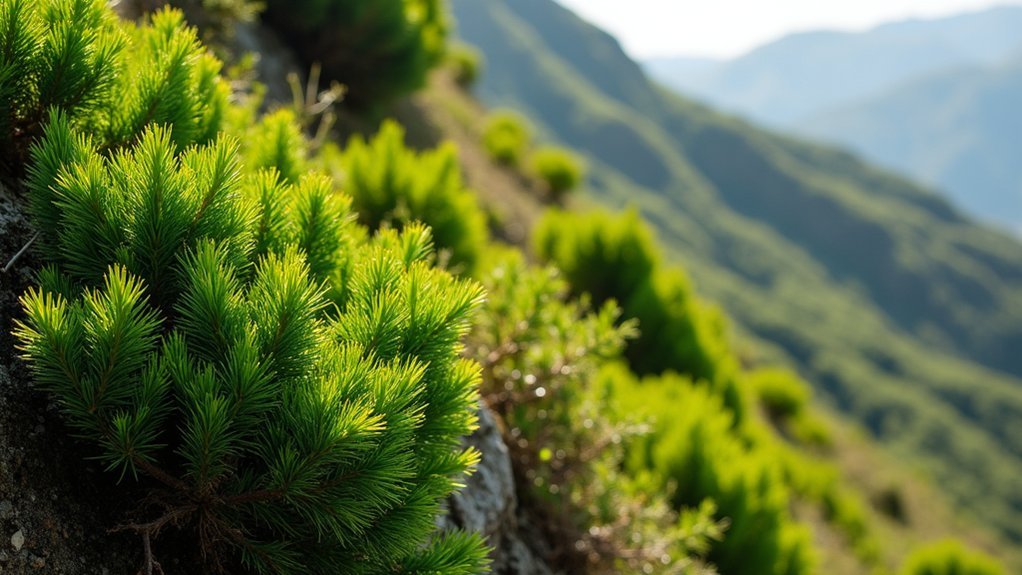
While many homeowners struggle with slope erosion, evergreen native shrubs offer an effective and attractive solution. Their extensive root systems stabilize soil throughout all seasons, preventing runoff during heavy rains.
Eastern Red Cedar’s year-round foliage creates a resilient barrier, while American Holly thrives in various soil types, providing dense growth that reduces erosion.
If you’re looking to add beauty while protecting your hillside, Mountain Laurel delivers stunning blooms alongside deep roots that anchor soil securely.
For shaded slopes, consider Catawba Rhododendron, which offers robust protection against soil erosion.
Don’t overlook Witch Hazel—it’s not only sturdy but also creates valuable habitat for wildlife while its roots bind soil in place year-round.
These versatile evergreen native shrubs combine practical erosion control with natural beauty.
Flowering Indigenous Shrubs That Prevent Erosion
Beyond their visual appeal, flowering indigenous shrubs serve as powerful allies in the battle against slope erosion. Common Elderberry’s extensive root systems anchor soil while providing beautiful blooms that enhance landscape aesthetics.
Native flowering shrubs do more than beautify—they combat erosion with powerful root systems that secure vulnerable slopes.
In wet areas, you’ll find Silky Dogwood particularly effective, as its fibrous roots bind soil and prevent washouts.
For drier slopes, consider Shrubby St. John’s Wort, whose deep roots stabilize soil while its vibrant yellow flowers brighten your landscape.
Virginia Rose offers a dual benefit with its dense growth habit that holds soil in place and attractive pink blooms that add visual interest.
Berry-Producing Local Plants for Wildlife-Friendly Barriers
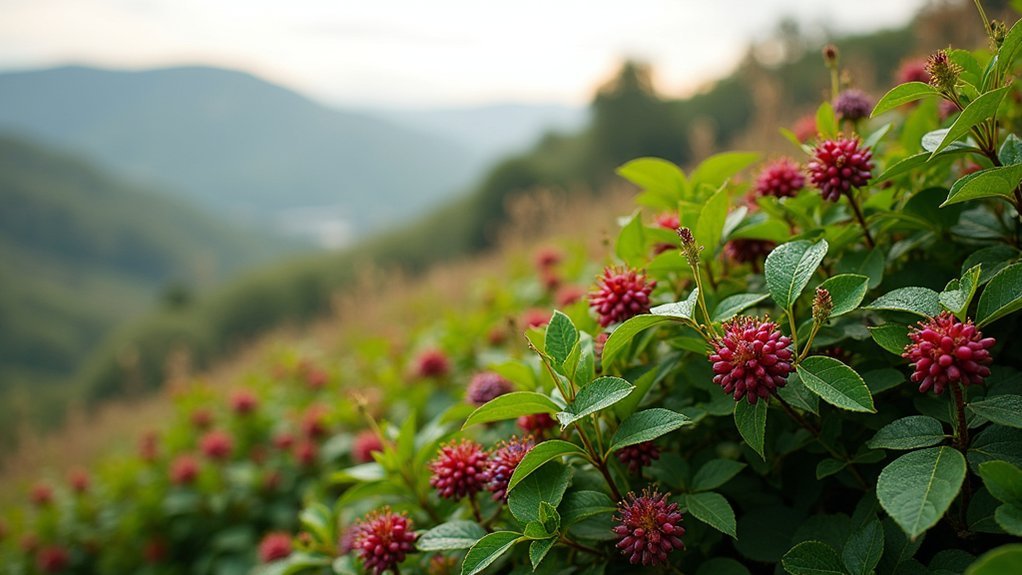
Creating habitat-rich slope barriers becomes possible when you incorporate berry-producing native shrubs into your landscaping plan.
Common Elderberry stabilizes soil on slopes while attracting birds with its edible berries. Similarly, Black Chokecherry forms dense thickets that prevent erosion while providing fragrant flowers and nutritious fruits.
Consider Northern Bayberry for sandy or rocky slopes—its aromatic berries serve as an excellent food source for birds, enhancing biodiversity.
Blueberry shrubs thrive in acidic soils with root systems that effectively bind soil on inclines. Serviceberry offers sweet fruits that support local wildlife while controlling erosion.
You’ll enjoy multiple benefits when planting these native shrubs: they’re not just functional barriers against soil loss, but also create wildlife corridors that transform your property into a thriving ecosystem.
Drought-Tolerant Native Shrubs for Low-Maintenance Slopes
When seeking sustainable solutions for erosion-prone areas, drought-tolerant native shrubs offer ideal protection with minimal upkeep. These plants combine extensive root systems with adaptable growth habits, making them perfect for soil stabilization on challenging slopes.
| Shrub Species | Benefits |
|---|---|
| Black Chokecherry | Vibrant fall foliage, thrives in varied soils |
| Common Elderberry | Wildlife habitat, edible berries, withstands dry spells |
| Silky Dogwood | Fibrous roots for erosion control, adapts to wet/dry conditions |
| Shrubby St. John’s Wort | Deep roots, full sun tolerance, summer flowers |
You’ll find these native shrubs require markedly less water than non-natives, supporting sustainable gardening practices. Their naturally evolved root systems effectively prevent erosion while creating valuable wildlife habitat, giving you both functionality and ecological benefits with minimal maintenance needs.
Fast-Establishing Regional Varieties for Immediate Stabilization
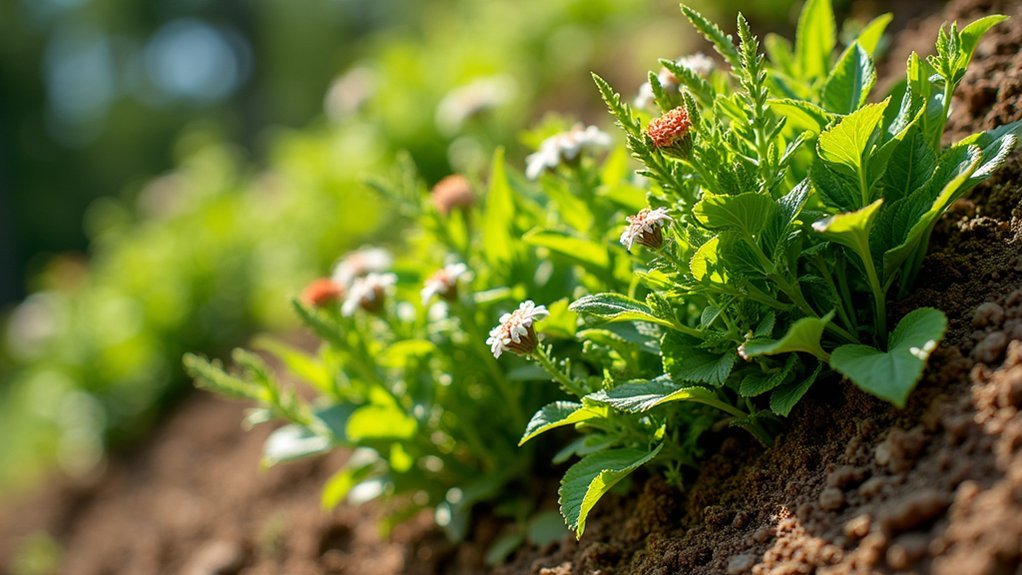
For properties requiring urgent erosion control, fast-establishing regional shrubs provide the quickest defense against soil loss.
Silky Dogwood excels with its fibrous root system that binds soil while supporting wildlife. You’ll find Common Elderberry particularly effective for rapid establishment, offering both erosion control and edible berries in runoff-prone areas.
Consider Shrubby St. John’s Wort for its deep roots that enhance soil stability while adding aesthetic appeal with its attractive foliage and flowers.
By selecting native shrubs, you’ll benefit from their natural adaptation to local conditions, reducing water needs and maintenance.
Implement a layered approach using multiple fast-establishing varieties to maximize biodiversity and moisture retention.
This strategy creates a resilient slope stabilization system that withstands extreme weather while creating a visually appealing landscape barrier.
Frequently Asked Questions
What Are the Best Plants to Stabilize a Slope?
You’ll find native shrubs like Silky Dogwood and Common Elderberry excellent for slope stabilization. Their extensive root systems bind soil effectively. Include Red Osier Dogwood for wet areas and pair with native grasses for layered protection.
What Is the Best Groundcover for a Steep Slope?
For steep slopes, you’ll get excellent results with Golden St. John’s Wort or Catmint. Their deep roots prevent erosion while providing attractive coverage. Fast-growing options like Phlox and Stonecrop offer quick protection against soil washout.
What Is the Best Plant to Block Neighbors’ Views?
For blocking neighbors’ views, you’ll find Winter Jasmine excellent with its 4-5 foot height and fast growth. Grow-low Sumac also works well, spreading up to 8 feet wide with dense foliage for privacy.
What Is the Best Border Shrub?
The best border shrub depends on your privacy needs. You’ll want Boxwood for formal edges, Hydrangea for colorful boundaries, or Arborvitae for tall screens. Choose varieties that match your climate and maintenance preferences.
In Summary
You’ll find these five local shrub varieties make the perfect solution for problematic slopes on your property. They’re not just functional erosion fighters—they’re beautiful additions that support local wildlife while requiring minimal care once established. By choosing native plants adapted to your region’s specific conditions, you’ve made a smart investment in your landscape’s long-term stability and ecological health. Start planting today!

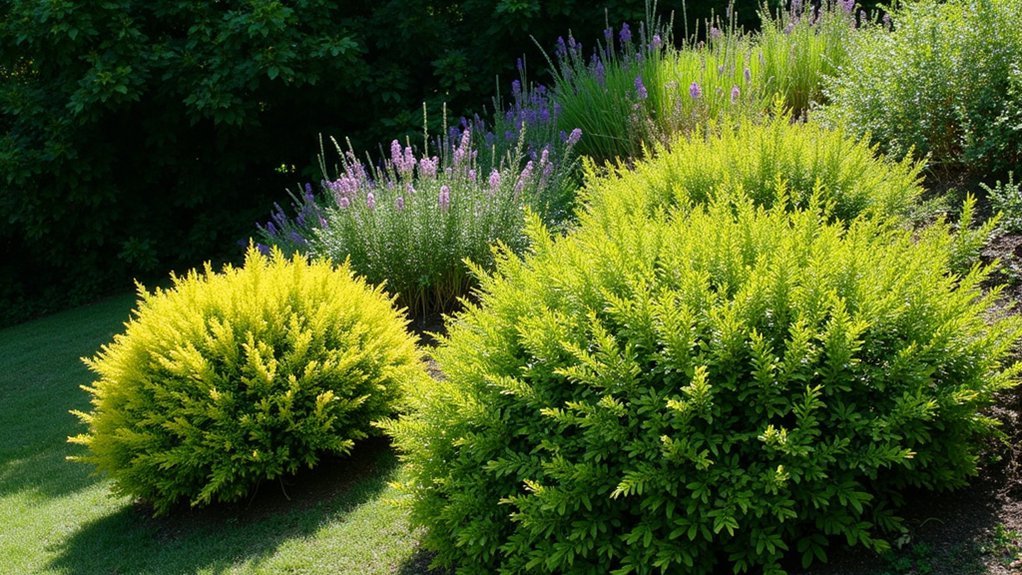
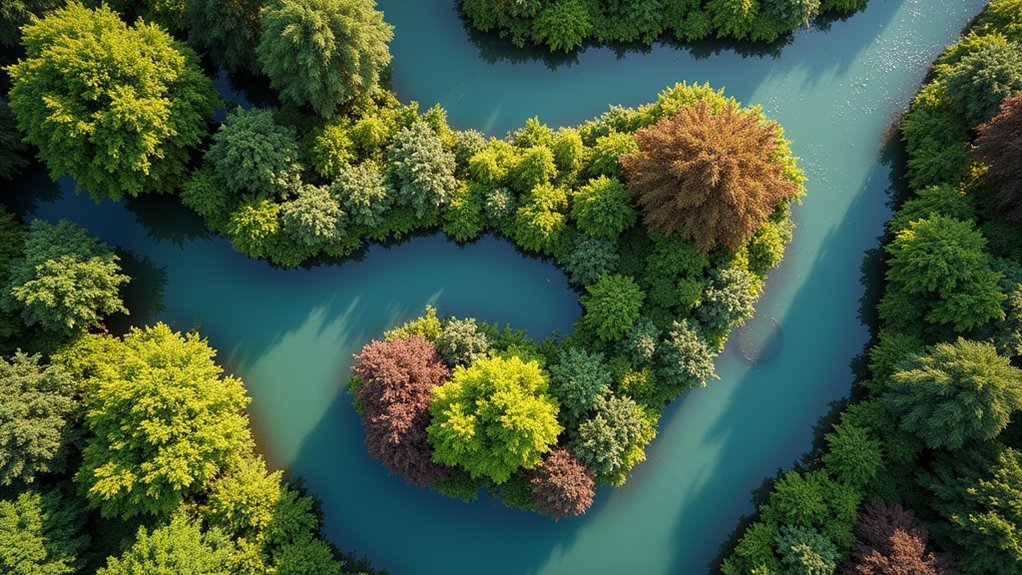
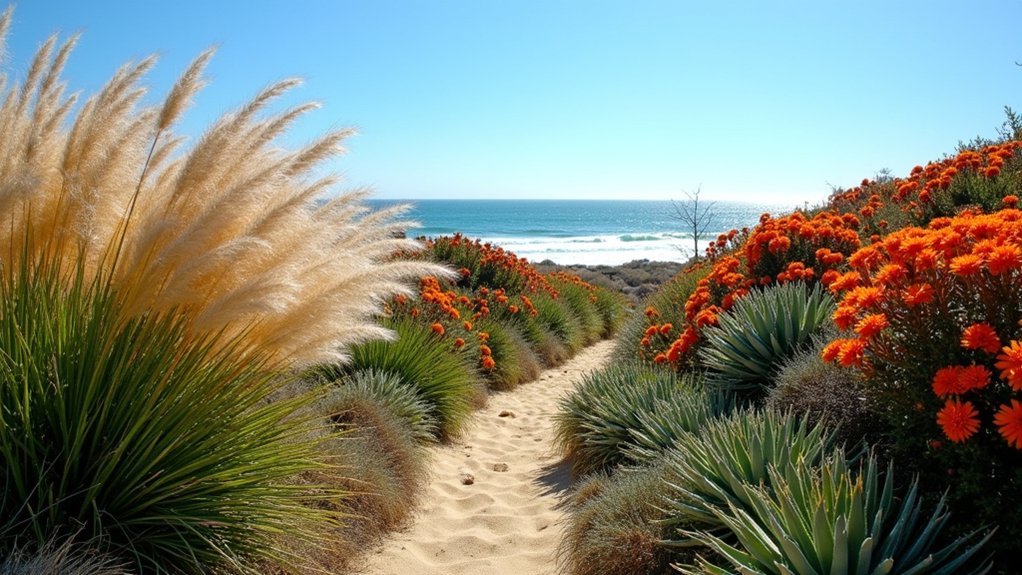
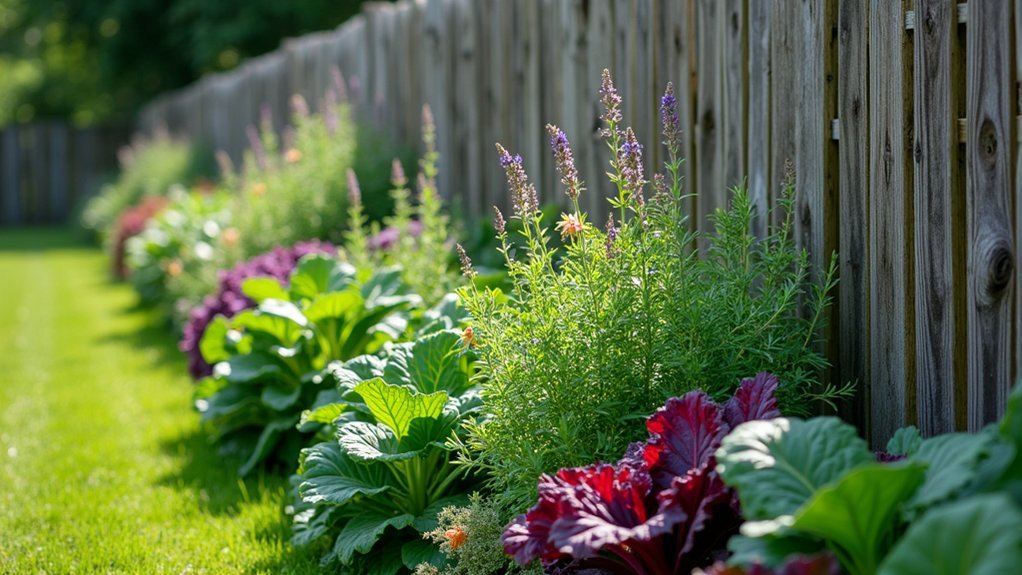
Leave a Reply